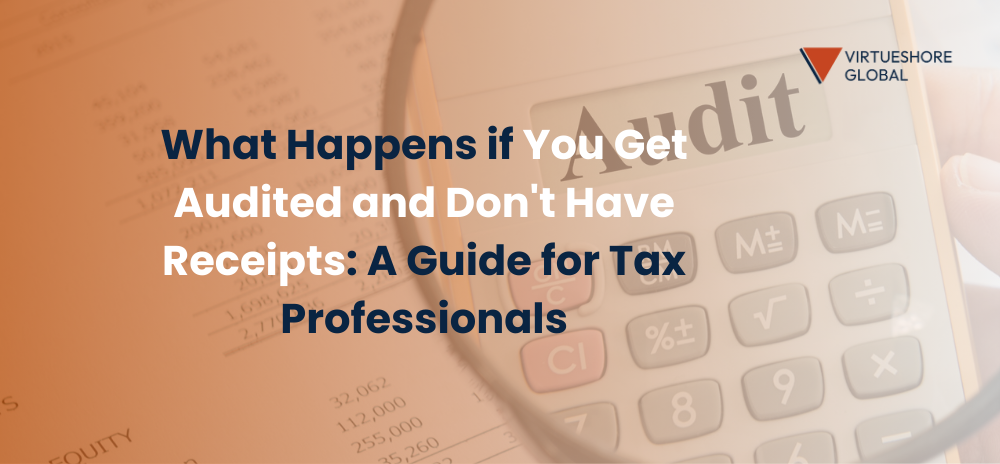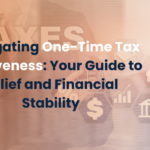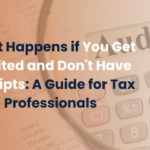Business owners dread receiving an audit notice from the IRS. However, there’s reassurance in having accurate tax returns and supporting documentation. It provides a strong defense against potential issues. But what occurs if you’re audited without the necessary receipts?
The repercussions of lacking proper documentation during an audit can be unpredictable, and it’s a situation best avoided. Whether you face this predicament or wish to gain insights to prevent it, continue reading for valuable information.
Understanding Tax Audits
A tax audit is when government authorities, like the IRS in the U.S., check your financial records and tax returns. They do this to ensure you report your income, deductions, and credits correctly according to tax laws.
Audits can happen for different reasons. Sometimes, they’re random checks to ensure everyone follows tax rules and doesn’t evade taxes. These random audits help keep the tax system fair.
Other times, audits happen because of “red flags.”
Red flags are signs in your tax return that raise questions. It could be high deductions or inconsistent income reporting. Businesses with complex finances might get audited more often because they have more opportunities for mistakes.
What Happens if You Get Audited Without Receipts
Facing an audit without enough receipts can lead to problems. Tax authorities use receipts to check if your taxes are accurate. Without them, you may face:
- Penalties: Tax authorities might fine you if they suspect errors in your reporting.
- Higher Taxes: Missing receipts can lead to higher taxable income, resulting in a bigger tax bill.
- Stressful Process: Audits require explanations, documents, and meetings, causing stress and uncertainty.
Keeping good records to avoid these issues during an audit is crucial.
What Happens When You’re Audited But Don’t Have Receipts?
Step 1: Contact the IRS
The IRS will send you a letter to start the audit process. Always make sure it’s a legitimate letter by calling the official IRS phone number if you have doubts.
Step 2: Gather Available Information
Before giving the IRS what you have, review your records. Check the numbers you reported in your tax forms.
Step 3: Justify Your Expenses
If you’re missing receipts, you can still claim expenses using the “Cohan Rule.” This rule allows you to claim the costs if they’re reasonable and credible. But there are limits, and you can only deduct the minimum standard amount set by the IRS without receipts.
Here are ways to justify expenses without receipts:
- Request new copies of invoices or receipts from suppliers.
- Use bank statements, credit card statements, canceled checks, and check registers to show payments made.
- Refer to your business calendar and correspondence for travel and entertainment records.
- Search through emails for business-related purchases and emailed receipts.
- Check your travel accounts for evidence of expenses.
- Use phone location records to show where you’ve been.
Step 4: Explain to the IRS
Organize your records and explanations before sending them to the IRS. If you meet with an IRS agent, be prepared to explain your supporting information for each area in question. Consider working with a tax professional if you need clarification on your documents.
Step 5: Address IRS Questions
Be ready to provide additional support for certain expenses if the IRS requests. Timely responses are important.
Step 6: Review IRS Findings
The IRS will use your provided information and their calculations to determine what you can deduct. Remember, you may only deduct the minimum standard amount without receipts. The IRS might disallow certain expenses if they find your evidence insufficient. You’ll receive the audit findings within 30 days.
Step 7: Decide What to Do
After receiving the IRS findings, you’ll need to either pay the amount owed or appeal the audit findings based on the outcome. This simple process outlines what to expect when you face a tax audit without receipts.
The possible outcomes of an IRS audit are as follows:
- Satisfaction: After reviewing your documents and explanations, the IRS may be satisfied with your compliance. They’ll confirm the numbers, and you can proceed without any issues.
- Additional Taxes: If the IRS believes you’ve claimed too many deductions, they may notify you of back taxes owed. This could also include fees for not paying the correct amount on time. You have several options to manage this:
- Pay the extra taxes promptly.
- Set up an IRS payment plan to pay the back taxes over time.
- Request a delay in paying the taxes.
- Appeal the back taxes and seek assistance from tax professionals like a tax lawyer or CPA to dispute the audit findings.
- Extended Review: In rare cases, the IRS might decide to examine your income tax returns for additional years, possibly up to six years, although this is uncommon. To ease concerns about past bookkeeping, consider investing in retroactive bookkeeping services, such as hiring accountants or professional bookkeepers to review and clean up your historical records.
Common Mistakes to Avoid
Facing a tax audit without the right paperwork can be scary for any business. To make it easier, it’s important to know the common mistakes businesses often make in this situation. Here are some things to avoid and tips on how to avoid them:
- Incomplete or Inaccurate Records: One of the most common mistakes is having incomplete or inaccurate financial records. Insufficient documentation can lead to disagreements with tax authorities and increased scrutiny.
- Delay in Responding: Responding to audit requests can create suspicion and complicate the audit process. Being prompt and cooperative is key.
- Lack of Communication: Failing to communicate effectively with the audit examiner can lead to misunderstandings and misinterpretations. Clear and open communication is vital.
How to Prevent These Mistakes
- Keep thorough records of all financial transactions, expenses, and deductions. Invest in digital accounting tools or hire professionals to help you maintain accurate records.
- As soon as you receive notice of an audit, start preparing your documentation. Inform your tax advisor or CPA immediately to ensure you’re well-prepared.
- Consider seeking assistance from experienced tax professionals who can guide you through the audit process. Their expertise can help you avoid common pitfalls.
Staying Prepared for Future Audits
Dealing with a tax audit without receipts is tough. But it’s also smart to prevent future audit problems. Here’s how:
Here’s how:
- Review your financial records now and then to catch mistakes or missing papers before an audit happens.
- Invest in training programs for your accounting and finance teams to stay updated with the latest tax regulations. Compliance should be an integral part of your company’s culture.
VirtueShore – Your Trusted IRS Expert!
Filing taxes can be challenging, especially when there are problems. If you can only provide some of the records the IRS needs, don’t stress.
At VirtueShore, we get it. Taxes can be tricky. Our experienced team knows your options and can tell you if the IRS will accept your records. We’ll fix your tax issues and help you organize your records for the future. When you need a dependable IRS expert, trust VirtueShore for help and peace of mind.
FAQs
How can I determine if I’m undergoing an IRS audit?
The IRS communicates exclusively through the United States Postal Service; they never initiate contact via phone, text, or email. Be cautious of such messages, as they are often scams to obtain your personal information.
Once you receive an official notice of an IRS audit, it’s time to take action. This involves crafting a comprehensive action plan, devising a communication strategy, and organizing financial records and accounting documents to build a strong defense.
Does the IRS scrutinize receipts during an audit?
Underreported income often triggers small business audits. The IRS evaluates whether to audit you by comparing your industry and location to determine typical deductions for similar businesses.
During the audit, the IRS will verify the accuracy of receipt copies, especially for underreported income or other discrepancies. If the provided materials fail to meet the IRS’s receipt requirements for items in your tax return, the IRS may request additional documentation.
What are the implications of undergoing an audit without having receipts?
If the IRS audits you and can’t find your receipts, don’t panic. The IRS understands that receipts can be lost, and they’ll accept other forms of documentation. Instead of receipts, you can provide an expense report that explains your spending. It’s important to ensure your reported expenses are considered ‘reasonable’ by IRS standards based on what similar small businesses spend in your state and industry.
Remember, deductions might only be approved if you have proper documentation. If not, you could face extra taxes, penalties, or interest. It’s a good idea to consult a tax professional specializing in audit defense to help navigate the audit process effectively.
What are the penalties or fines if I can’t recover my receipts?
If the IRS accepts the report you’ve generated detailing your business expenses, you will not receive a penalty, thus concluding your audit. However, there is a chance that the IRS will reject some or all of your deductions, which is called a “disallowed deduction.”
What are the financial consequences of disallowed deductions?
Every deduction the IRS disallows will be added to your taxable income, increasing your tax bill. This increase could push you into a higher tax bracket, paying more on your taxable income for the calendar year.
Additionally, you will be responsible for interest and fees associated with your disallowed deductions. Failure to pay these penalties promptly post-audit may result in additional penalties.
How can I protect myself with professional audit defense?
The benefits of a robust audit defense are numerous. 1-800Accountant’s Audit Defense service ensures all your income tax audit materials are in order and ready for IRS scrutiny, helping you avoid future mishaps. Audits happen, so it’s best to be prepared!








